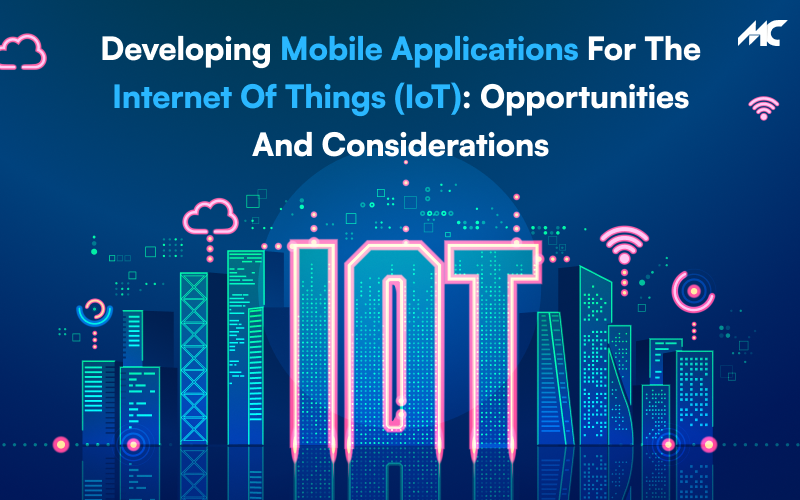Developing Mobile Applications for the Internet of Things (IoT): Opportunities and Considerations
The Internet of Things (IoT) is a rapidly growing network of interconnected devices, vehicles, and other physical objects. A report by Statista suggests that there were around 15.4 billion devices connected to the Internet in 2015, but shockingly now it is expected to reach 30.7 billion by 2020 and 75.4 billion by 2025, projecting 3x growth in ten years. By improving efficiency and lowering costs, the IoT is simultaneously disrupting current markets and generating new ones.
As an IoT App Development company, it is essential to understand the opportunities and considerations for developing mobile applications for the Internet of Things. By understanding the challenges and opportunities associated with developing IoT applications, you can ensure that your business is taking advantage of the latest technological advances to provide customers with the best mobile experiences. In this blog post, we will explore the opportunities and considerations for developing mobile applications for the Internet of Things, as well as discuss the potential of IoT in businesses.
- What does IoT even mean?
- What are the four levels of IoT Apps?
- How is it benefitting businesses around the globe?
- Where are IoT Apps Used?
- What Are The Different Types of IoT Mobile App Frameworks Present?
- Why IoT Is A Golden Opportunity For Mobile App Developers
- How To Choose the Right Framework For IoT Mobile App Development
- Conclusion
What does IoT even mean?
The Internet of Things (IoT) is a rapidly expanding technology ecosystem that connects physical objects with the digital world. IoT allows physical devices to communicate with each other, sending and receiving data to control and automate everyday activities. In essence, it enables the connection of almost anything with an internet connection, which has led to countless applications for businesses in all industries.
IoT technology is growing at an impressive rate, with experts expecting that the global IoT market will exceed $1 trillion by 2025. This is not just limited to consumer products either; companies across industries have already started to leverage IoT capabilities to increase their productivity and efficiency. For example, manufacturing companies can use IoT sensors to monitor machinery in real-time or collect data from streamlining production processes.
When it comes to IoT mobile app development it is showing tremendous growth. Thanks to the increasing ubiquity of mobile devices and powerful software development tools, businesses now can leverage IoT for mobile app development. Companies are investing in developing apps that can integrate with connected devices to access data, create useful visualizations, and even control those devices from remote locations.
To understand its true potential, it is important to know what IoT app development costs and trends are associated with this process. The cost of developing an IoT application can range from thousands of dollars to hundreds of thousands of dollars, depending on the complexity and features required. Additionally, there are several emerging trends in IoT app development that companies should be aware of. For example, cloud integration, artificial intelligence (AI), and machine learning are becoming increasingly popular options for mobile apps that need to interact with IoT devices. Additionally, the adoption of low-code platforms has also made the process of building an IoT app much simpler and faster.
What are the four levels of IoT Apps?
The core of the IoT concept lies in connected devices that communicate with each other through the internet. As such, there are four distinct levels of the IoT: sensing, communication, data processing, and application.
At the first level of the IoT, sensors are used to collect data from the environment around them. These data streams can be defined based on the type of business. These can even include information such as temperature, humidity, location, or any other environmental conditions. These data points can be enabled in wearable devices or simple AI-based devices like Alexa as well.
At the second level, this data is then communicated over a network, such as Bluetooth or Wi-Fi, to other connected devices, allowing them to interact with each other and with the outside world. Software and the supporting infrastructure are included in this tier. As data is transported from the linked device to the third tier to be organized and stored, this is where the real lifting takes place.
The third level of the IoT focuses on how this data is processed. Data can be analyzed and interpreted by machine learning algorithms or AI to identify trends, patterns, and insights. At this stage, this data can be used to make decisions, such as when to turn off lights or adjust heating settings.
The fourth and final layer of the IoT is the application layer. This is where mobile apps and other web-based software solutions come into play. These solutions allow users to access data from their connected devices, such as thermostats, lights, or security systems. Through these applications, users can control their devices and view data from them. This layer of the IoT also involves considerations around security, user experience, scalability, and cost.
There are trends in IoT app development that are affected by current industry trends and advances in technology. Therefore, an IoT App Development company needs to stay abreast of the latest developments to make informed decisions regarding their IoT app development budget.
How is it benefitting businesses around the globe?
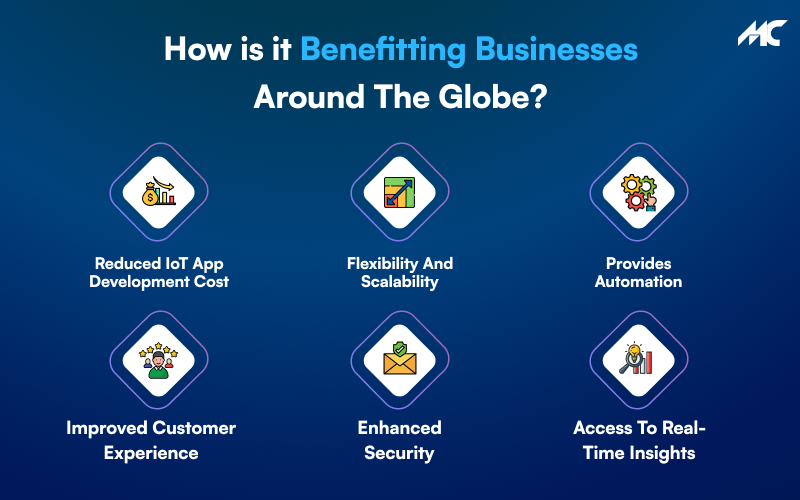

The Internet of Things (IoT) has revolutionized the way businesses operate and interact with customers. IoT has become an integral part of many companies’ operations, offering a range of advantages for businesses looking to gain a competitive edge. Connected devices allow customers to interact directly with businesses through their mobile phones or other smart devices, offering a more personalized experience. Businesses can also use connected devices to collect data about customer behaviors and preferences to better understand their customers and develop tailored services. IoT app development trends indicate that the technology will continue to grow in popularity as businesses embrace the potential it offers.
In addition, as IoT device manufacturers produce improved and more cost-effective products, businesses will have even more opportunities to take advantage of the cost savings and customer engagement benefits that IoT offers. With the growth of connected devices, the opportunities for IoT app development are immense, offering a wide range of potential benefits. Here are six key advantages that businesses can reap from investing in IoT app development:
1. Reduced IoT App Development Cost:
Businesses can reduce their development costs by relying on existing frameworks for their IoT app development, as these frameworks are often open source and require less manual coding. By using existing frameworks, businesses can also ensure compatibility with a wide range of devices and operating systems.
2. Flexibility and Scalability:
IoT apps are highly flexible and can be easily scaled up or down depending on the needs of a particular business. This is due to the fact that most IoT apps rely on existing cloud platforms, which offer a degree of scalability that traditional software development lacks.
3. Provides Automation:
With the help of IoT applications, businesses can automate many of their mundane tasks, saving time and money. This automation also helps to free up resources so businesses can focus on more strategic tasks.
4. Improved Customer Experience:
Through advanced analytics and insights gleaned from IoT data, businesses can better understand customer behavior and provide tailored experiences that will better engage customers. This improved customer experience often results in increased customer loyalty and repeat purchases.
5. Enhanced Security:
With the help of the latest security measures, businesses can protect their data from unauthorized access or malicious attacks. IoT devices are connected to one another through secure networks that offer an extra layer of security for confidential data.
6. Access to Real-Time Insights:
IoT applications give businesses access to real-time insights about their operations, allowing them to take corrective action quickly if needed. This helps businesses make faster and more informed decisions, leading to improved efficiency and higher profits.
By leveraging the latest technologies, businesses can benefit from a range of cost savings, increased efficiency, and improved customer experience. With the help of an IoT App Development company, businesses can tap into new opportunities that are made possible by leveraging the power of the Internet of Things.
Where are IoT Apps Used?
IoT apps are designed to connect devices, allowing them to interact with each other and exchange data. IoT apps enable businesses to automate processes, improve efficiency, and enhance customer experiences. IoT apps’ use cases vary in complexity and can be used in a variety of ways depending on the specific needs of the business. Here are some of the prominent use cases
- Healthcare
- Manufacturing
- Personal Wellness
- Smart Wearables
- Utilities and Energy
- Government / Public Sector
- Real Estate
- Transportation and Logistics
- Supply Chain
- Retail
1. Smart Home System:
Smart Home System allows users to control their lights, locks, and appliances remotely using a smartphone or other device. This type of system can be very useful in controlling energy consumption and saving money on utility bills. Additionally, it can provide added security for the home by providing access control and monitoring.
2. Asset Tracking:
This type of application uses GPS or RFID technology to track objects in real time. This can be used for tracking shipments, inventory levels, delivery status, and more. Asset tracking can help businesses reduce losses from theft and improve operational efficiency by providing data on delivery times and locations.
3. Repair And Maintenance:
Businesses also utilize IoT app development for predictive maintenance. Predictive maintenance helps companies anticipate equipment failures before they occur, allowing them to take preventive measures that can save time and money. By utilizing this application, businesses can increase the life of their equipment and ensure smoother operations overall.
What Are The Different Types of IoT Mobile App Frameworks Present?
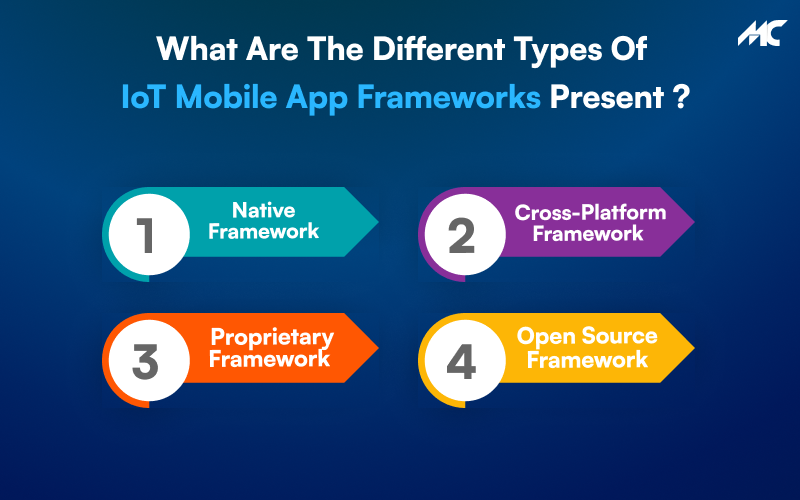

IoT app development is trending, with new frameworks emerging on the market to support the development of mobile applications that work within IoT networks. There are a few common types of IoT app frameworks available today:
1. Native Framework:
This framework is the most popular and allows developers to create apps specifically designed for their desired platform. It enables high levels of security, performance, and user experience. This framework provides access to all the underlying platform capabilities, such as hardware and software.
2. Cross-Platform Framework:
This framework is used for developing an application for multiple platforms simultaneously. It offers a unified codebase and leverages components from each platform to ensure a consistent user experience across devices.
3. Proprietary Framework:
This framework is owned by the company that develops it and only works with the company’s products. It allows developers to customize the application with its features, APIs, and services.
4. Open Source Framework:
This framework is open source and anyone can access it for free. The codebase is shared by a community of developers and can be used to create a wide range of applications. The main benefit of this type of framework is that it is highly customizable and cost-effective.
Choosing the right framework depends on a number of factors such as the type of application being developed, the device platform, the project requirements, and budget constraints. With these IoT app development trends in mind, businesses can find the right solution for their needs.
Why IoT Is A Golden Opportunity For Mobile App Developers
As the Internet of Things (IoT) continues to expand and become more integrated into businesses, mobile app developers are presented with a wide array of development opportunities. From monitoring and collecting data from connected devices to creating new products and services, the IoT has created a plethora of opportunities for mobile app developers to capitalize on.
For starters, businesses can use the IoT to monitor, collect, and analyze data from connected devices. This data can then be used to make informed decisions on how to improve existing products and services or create entirely new ones. This opens up the possibility of creating apps specifically designed to manage IoT-connected products and services, giving mobile app developers an entirely new market to explore.
Finally, mobile app developers can use the IoT to develop apps that use data from connected devices to provide insight into customer behavior or trends. By connecting devices and gathering data from them, businesses can gain a better understanding of how their customers are using their products and services. This allows them to optimize their products and services to better meet the needs of their customers.
Overall, the Internet of Things presents mobile app developers with an abundance of development opportunities. From monitoring and collecting data from connected devices to creating new products and services, there is no shortage of potential applications that can be created with the IoT. By staying relevant with the latest IoT app development trends and skills, mobile app developers can take advantage of these opportunities and create powerful, innovative apps that can help businesses stay ahead of the competition.
How To Choose the Right Framework For IoT Mobile App Development
Choosing the right framework for developing an IoT mobile app can be a daunting task, especially when considering a large number of frameworks available. Here are some tips on how to choose the right framework for your project:
1. Consider your specific application needs:
The first step is to consider the specific requirements of your application, including the type of device it will run on and its target platform (e.g. iOS, Android). This will help you decide wisely.
2. Research existing frameworks:
Once you’ve narrowed down your choices, it’s important to research existing frameworks and their capabilities. Look for frameworks that offer comprehensive solutions for IoT development, such as easy scalability and integration with existing systems.
3. Consider IoT app development costs:
Different frameworks have different pricing models, so make sure to consider the development costs before making a decision.
4. Evaluate performance:
When selecting a framework, it is also important to evaluate its performance. This means looking at factors such as latency, data transfer rates, power consumption, and overall stability.
5. Security and privacy:
Finally, security and privacy should always be taken into consideration when choosing a framework. Make sure the framework has secure data transmission protocols, encryption options, and access control features.
By following these tips, developers can ensure that they select a framework that is right for their particular application and its requirements. With the right framework in place, mobile app developers can be confident that their IoT projects will be successful.
Conclusion
As more businesses are embracing IoT technologies, the demand for custom-built apps will grow significantly. Companies that want IoT in mobile app development must understand the key considerations that come with designing and building applications for the IoT. These include selecting the right platform, frameworks, and APIs to power the application; understanding the different types of devices involved; and leveraging the latest technologies to enable real-time data analytics and secure communications.
MobileCoderz is a top-rated IoT App Development Company that can help companies of all sizes build innovative and reliable IoT applications. With its experienced development team, MobileCoderz has the skills to develop an IoT app for any business. It can help you optimize your existing processes or create a new IoT application from scr atch. With the cutting-edge technology and expert skills, you can be sure that your IoT application will be future-proof and robust. So if you’re looking for a reliable and efficient IoT App Development Company, MobileCoderz should be your go-to choice.
-

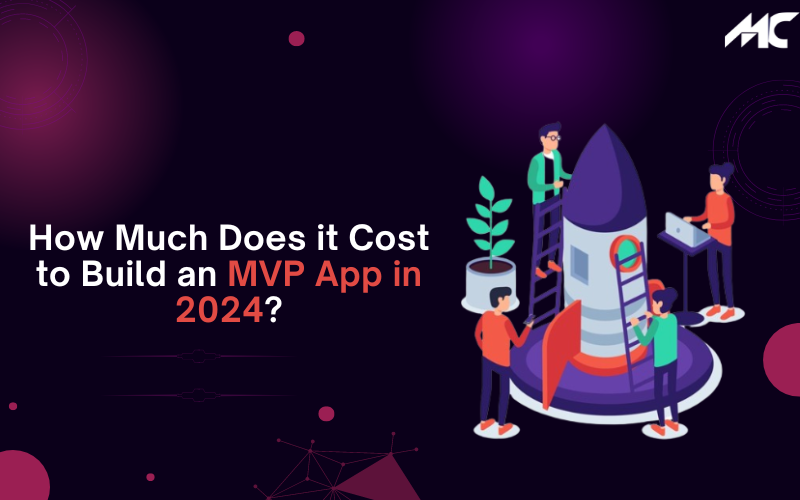 How Much Does it Cost to Build an MVP App in 2024?
How Much Does it Cost to Build an MVP App in 2024? -

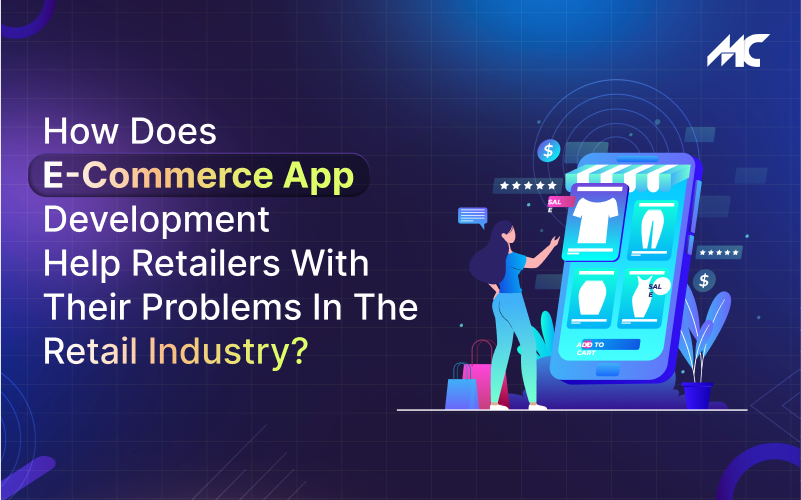 How Does E-Commerce App Development Help Retailers With Their Problems in the Retail Industry?
How Does E-Commerce App Development Help Retailers With Their Problems in the Retail Industry? -

 How AI is Changing the Landscape of the Online Food Delivery Industry?
How AI is Changing the Landscape of the Online Food Delivery Industry?



